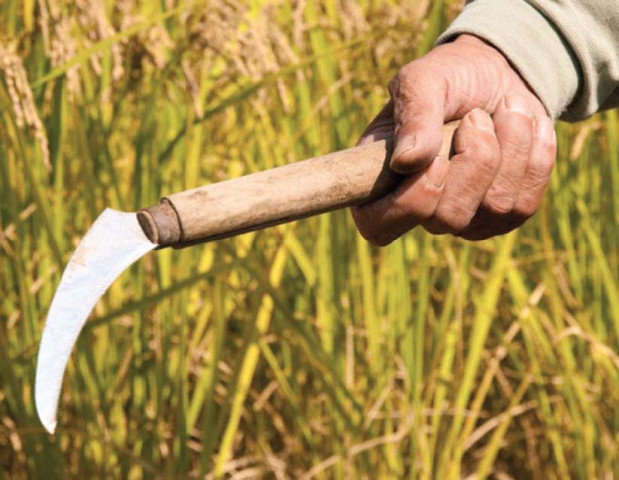Land rights: ‘Our blood and sweat makes land fertile’
Participants of policy dialogue discuss peasant women’s resilience.

A farmer said that before the elections, Prime Minister Nawaz Sharif had promised to give them land rights during his election campaign but the promise remained unfulfilled. PHOTO: FILE
“Our forefathers developed this land and we will not leave it. Our blood and sweat has made it fertile”, said a farmer Katherine Chan at a policy dialogue between peasant women and members of parliament and government officials on Saturday.
Chan said that before the elections, Prime Minister Nawaz Sharif had promised to give them land rights during his election campaign but the promise remained unfulfilled.
Gulnar Tabassum of Shirkat Gah said her organisation had tried to ensure that parliamentarians were present at the dialogue, but Minister Yawar Zaman who had promised to attend could not make it due to his father’s illness. She said the dialogue’s objective was to bridge the gulf between the state and the citizens. Another objective, she said, was to make peasant women aware of government policies.
Tabassum said the women needed help to network with policy makers. She said many men did not want women to participate in a campaign for change. She said even when they allowed women to support their objectives, they did not empower women.
She said Shirkat Gah considered it necessary to create a platform for women farmers, from which they could lead.
Anjuman-e-Mazareen Secretary Younas Iqbal said he had worked in brick kilns and realised that women were far more resilient then men. “If they make up their minds about something they stick to it.” Iqbal said the families of Okara peasants had been working on these lands before partition. He said the British had promised they would get the land they were settled on.
The lease was supposed to expire in 1913, after which the farmers would be given ownership of the land. That did not happen, even after partition, he said.
Iqbal said the peasants had started demonstrating for their rights actively during Bhutto’s era, but land reforms by his government were exploited by land lords.
He said in 1998, Nawaz Sharif’s government promised that farmers would be allotted seven marlas each through the revenue board (Jinnah Abadi scheme).
Iqbal said that in 2000 it was announced that the land would be auctioned and they found out that it would be given to army officers and would be forced to vacate their homes. He said it was at that point that peasants in Okara started their movement. He said coercive state forces were used against them and 18 people died. He said many others spent months in jail.
Asia Bibi, one of the peasants, said their core problem was that women were not recognised as agricultural labourers. “Women get up at four in the morning and do 80 per cent of the work in the farms and at home, but they aren’t considered equal to men.” She said women should have land ownership. In factories workers are given health benefits and so on, but when farmers work they are not given any such benefits.
Cecilia Ayub Pervaiz, another peasant, said that Mian Yawar Zaman should have sent some representatives if he couldn’t come. She said that six villages in Okara, 10/4L, 9/4L, 8/4L, 11/4L, 5/4L, 3/4L and two villages in Khanewal including Chak 135 and 16L, did not have high schools and hospitals.
She said they the bus fare to Okara city was Rs150, which most families could not afford. Pervaiz demanded that the government provide schools and hospitals where they were accessible.
Published in The Express Tribune, May 12th, 2014.



















COMMENTS
Comments are moderated and generally will be posted if they are on-topic and not abusive.
For more information, please see our Comments FAQ